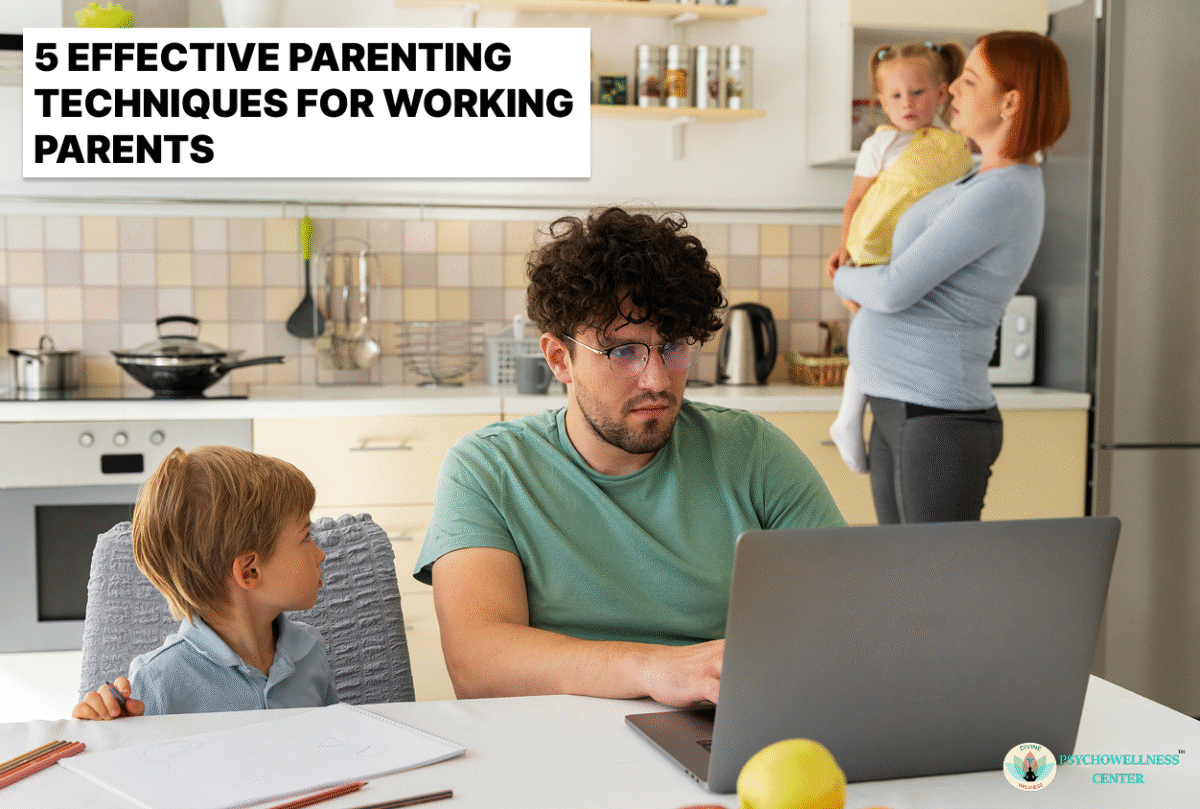Being a parent is a full-time job. Being a working parent? That’s two full-time jobs at once — and neither comes with clear instructions. Managing both a career and family life can feel like a marathon that never ends. Emails, deadlines, meetings… and then there’s dinner, homework help, bedtime stories, and sometimes, unexpected meltdowns.
Alongside this daily juggling act, many working parents also silently carry emotional burdens: stress, anxiety, relationship issues, self-esteem dips, and evendepression that goes unacknowledged. Not only does this impact mental health, but over time, it can also affect physical wellness, from poor health to irritability and anger outbursts.
But here’s the truth: doing everything perfectly isn’t the goal. Being intentional is. Even with a packed schedule, there are meaningful and realistic ways to connect with your child, support their emotional growth, and still protect your own well-being. Let’s explore five practical parenting techniques designed for parents managing careers while raising emotionally secure kids.
- Make Small Moments Count
When time is limited, it’s not about how long you’re present — it’s about how present you are. Children are incredibly perceptive. Even brief but focused interactions can create a deep sense of connection and safety.
Ideas to Try:
- Share a quick story while driving to school.
- Ask about the “best and hardest” part of their day over dinner.
- Create a 5-minute bedtime ritual: a hug, a song, or a brief check-in.
These tiny rituals build trust and help buffer children against emotional challenges like social comparison, peer pressure, and low self-esteem.
2. Stick to Predictable Routines
A stable routine helps children (and parents) feel more grounded. When kids know what to expect, their emotional regulation improves, reducing anxiety, tantrums, and bedtime battles.
How to Do This:
- Keep mealtimes and bedtimes consistent, even on weekends.
- Introduce a winding-down activity before bed (reading, quiet time)
- Display a weekly family calendar — visual predictability reduces stress.
For working parents, routines are a time-saving tool that prevents reactive parenting and makes space for more intentional interactions.
3. Be Fully Present When You’re Home
You may not make every school event — and that’s okay. What matters most is how emotionally available you are when you’re with your child. Your undivided attention helps them feel secure, validated, and loved.
Ways to Be Emotionally Present:
- Put away distractions — especially screens.
- Validate your child’s emotions without rushing to “fix” them.
- Show curiosity in their world, no matter how small the details.
Children model how to manage emotions, anger, and disappointment by watching you. This is where person-centred therapy principles — empathy, unconditional positive regard, and presence — can inspire your parenting style.
4. Ask for Help — and Accept It
Working parents often fall into the trap of doing it all, only to end up feeling depleted and overwhelmed.
Where You Can Delegate:
- Share tasks with your partner or spouse to reduce marital conflicts.
- Involve your kids in age-appropriate chores — this builds responsibility.
- Rely on your support network: family, friends, or even online resources.
Support can also come through therapy or parenting counselling, which offer space to unpack guilt, anger management struggles, and stress linked to high parental expectations.
5. Lead by Example
Children learn by observing. Your habits become their internal compass for how to manage emotions, relationships, and life’s challenges.
If they see you constantly overwhelmed, they may internalise that as the norm. But if they see you setting boundaries, showing vulnerability, or practising counselling-inspired techniques like emotional regulation, they’re more likely to grow into balanced, self-aware individuals.
Model Emotional Intelligence by:
- Taking breaks and explaining why they matter.
- Managing your anger constructively — show them a healthy expression.
- Practicing self-care and letting them witness it without guilt.
Conclusion
There will be days when parenting feels like a battle — missed events, forgotten lunchboxes, or nights when patience runs out. But that doesn’t mean you’re failing. Your child doesn’t need perfection. They need a parent who tries, learns, and continues to show up — even after a tough day. Real parenting is messy, emotional, and deeply human. What matters is connection, not control. And if you’re struggling with stress, relationship issues, self-esteem, or depression, it’s okay to seek help for yourself and your family.
Professional assistance is available if you’re looking for the “best psychologist near me” to support your journey as a working parent or assist with the emotional development of your child, especially for those managing learning challenges, behavioural issues, or family stress. The Psychowellness Center’s experienced therapists in Janakpuri and Dwarka Sector-17, Delhi, specialise in parenting counselling, anger management, and emotional regulation, using approaches like person-centred therapy. Prefer online therapy? TalktoAngel offers secure, private sessions with qualified psychologists across India. Empowerment starts with the right support — call 011-47039812 or 7827208707 to take the first step toward a more emotionally fulfilling parenting journey.
This blog features expert insights from Dr. R.K. Suri, Clinical Psychologist, and Ms. Riya Rathi, Counselling Psychologist, who provide strategies to enhance mental strength.
References
- Center on the Developing Child at Harvard University. (2010). The science of early childhood development (InBrief). Harvard University.
https://developingchild.harvard.edu/resources/inbrief-science-of-ecd/ - Eisenberg, N., Spinrad, T. L., & Eggum, N. D. (2010). Emotion-related self-regulation and its relation to children’s maladjustment. Annual Review of Clinical Psychology, 6, 495–525. https://doi.org/10.1146/annurev.clinpsy.121208.13120
- Faber, A., & Mazlish, E. (2012). How to talk so kids will listen & listen so kids will talk. Scribner.
- Galinsky, E. (2010). Mind in the making: The seven essential life skills every child needs. HarperStudio.
- https://www.psychowellnesscenter.com/Blog/how-to-improve-the-parent-child-relationship/

